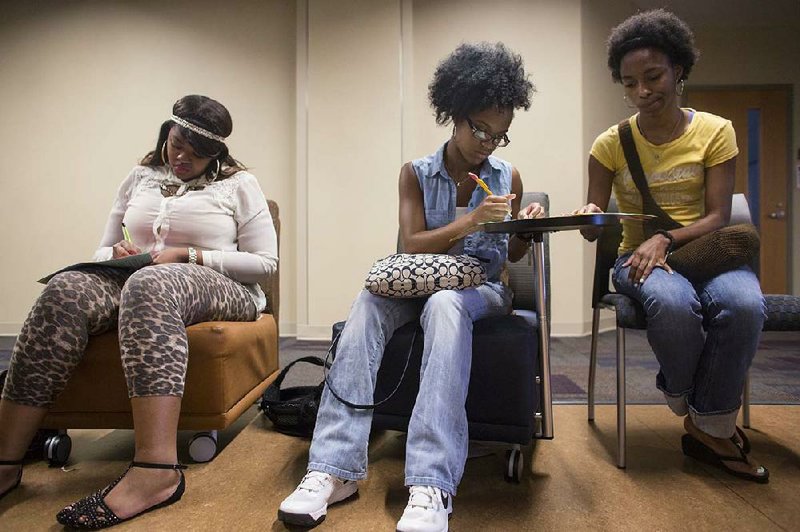Davion Williams dreaded taking math classes in high school, but he talks excitedly about working out algebra equations on a white board on a recent summer afternoon.
In fact, math is the 19-year-old's favorite subject at the Donaldson Summer Bridge Programs.
"I'm being refreshed on math I've never even been taught," said Williams, who plans to study physical therapy when he starts college at the University of Arkansas at Little Rock later this month. "Once it's taught and you understand it, you want to keep going on."
Williams is one of 96 students taking part in this year's Summer Bridge Programs, which aim to get high school graduates excited about the possibility of going to college.
The Summer Bridge Programs consist of two groups of students who are participating in three-week residential college readiness programs.
Thirty-eight students, including Williams, are part of the Dr. Charles W. Donaldson Summer Bridge Academy, a program for students admitted to UALR and who, because of their test scores, would have had to take remedial math and English courses.
The other 58 students are Dr. Charles W. Donaldson Scholars, recent graduates of the Pulaski County Special School District. Many of those students haven't applied for college or don't know if they want to attend college.
The Summer Bridge Academy is funded by the Winthrop Rockefeller Foundation, Bank of America, the Charles A. Frueauff Foundation and UALR.
The Donaldson Scholars program is funded by a plan approved by U.S. District Judge D. Price Marshall Jr. in June that awarded $10 million of the Pulaski County Special School District's limited desegregation funds over three years to UALR for the program.
Donaldson Scholars who complete the summer program and attend UALR or Philander Smith College, a private college in Little Rock that also offers the Donaldson Scholars program, will be eligible for $2,500 scholarships. The scholarships are renewable for up to four years and $10,000.
This is the Bridge Academy's second summer. It's the first time the Donaldson Scholars have been part of the group.
The students work daily with UALR students and instructors on math, writing and reading skills. They also receive coaching on how to be successful in college.
Amber Smith, director of the programs, said an obstacle these students have to overcome is their fear of college.
She said many of them don't know a lot of people who have gone to college, and some have even been dissuaded from continuing their educations after high school.
"Some of our students have been told they're not college material," she said.
Sherry Rankins-Robbertson, director of composition at UALR, said attending the programs on a college campus shows students that it's not as scary as they might think.
She said it will especially ease the transition from high school to college for the Bridge Academy students, who will all be attending UALR in the fall, and hopefully help them stay in school.
"We know that retention has to do with grounding in a specific location," she said.
Students are tested each week on their proficiency in the subjects they've been learning until they achieve a score that surpasses the standard for placing out of remedial courses.
Melissa Hardeman, a UALR math professor who teaches at the summer programs, said the instructors tailor their teaching methods to their students' learning styles.
"It's very fluid and changes," Hardeman said. "We really want this to be a living, breathing relationship."
The instructors use techniques that get Williams and his classmates actively engaged in their coursework. Most lessons start with a short period of instruction, followed by students doing an activity such as solving problems on the white board. Students are also encouraged to teach what they learn back to their peers, which deepens their understanding of the concepts.
Smith said the techniques used are simple, but they're not common in traditional school settings.
The instructors also incorporate subjects that students already know a lot about into their lessons.
Rankins-Robbertson said students were asked to write a spoken-word poem about an illness that plagued their communities, families or themselves.
Though many of the students complained that they weren't good at writing, once they started writing about their own experiences it became less difficult.
Similarly, the students read an excerpt from Malcolm X's autobiography about how he learned to read. They then wrote a narrative of their own experiences learning to read.
Rankins-Robbertson said another important part of the program is shifting the focus off of grades so that students don't get discouraged by low test scores.
"We have been socialized in the school system that a test score tells us 'you're smart' or 'you're not smart,'" she said.
Instead, the programs focus on and reward the pursuit of knowledge.
"The key is for students to understand, 'When I put forth the effort, I improve,'" Smith said.
Williams, who along with the rest of this year's participants graduated from the programs Saturday, said this experience has changed his perspective on learning.
"I feel like every kid should do it," he said. "It's a life changer."
Metro on 08/03/2014

